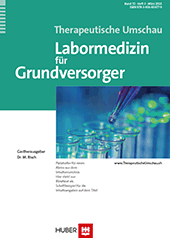Der Laborfehler – warum das Labor nicht (immer) schuld ist
Abstract
Mehr als die Hälfte der „Laborfehler“ sind schon passiert, bevor die Messung im Labor beginnt und viele passieren auch nach der Analytik. Bei rund 60 – 90 % aller fehlerhaften oder unerwarteten Laborresultate liegen die Ursachen bei der Prä- oder Postanalytik und nur in ca. 10 – 15 % aller Fälle ist die eigentliche Analytik fehlerhaft. Interne und externe analytische Qualitätskontrolle sind heute selbstverständlich; Verbesserungsbedarf gibt es vor allem noch bezüglich der Methodenstandardisierung. Es wäre wünschenswert, vermehrt auch die Prozesse vor und nach der Analyse zu verbessern. Gute Patientenvorbereitung, zuverlässige Identifikation und eine korrekte Blutentnahme sind noch nicht überall selbstverständlich – bessere Ausbildung in diesem Gebiet tut not. Auch bei der Kommunikation der Resultate und dem Umsetzen der klinischen Konsequenzen gibt es immer noch Verbesserungsmöglichkeiten. Die Fehler in allen Phasen des analytischen Prozesses beinhalten wertvolle Hinweise für Optimierungen. Dieses Potential könnte mit einer veänderten Fehlerkultur ausgeschöpft werden.
More than half of the so called “laboratory errors” has already happened before the analysis starts in the laboratory and many mistakes are made after the analysis itself. Pre- and post-analytical errors cause 60 to 90 % of all unexpected or erroneous values; only 10 to 15 % are caused by analytical problems. Internal quality control and external quality assessments are a matter of course today while standardisation still could be improved. The pre- and post-analytical processes however are only scarcely supervised. Good patient preparation, reliable patient identification and correct blood draws still cannot be taken for granted – improved training and education are necessary. There is also room for improvement in the communication of the results and the implementation of the consequences thereof. Errors in all phases of the analytical process contain valuable clues for optimisations. An improved culture of failure management would allow tapping the full potential of these clues.



